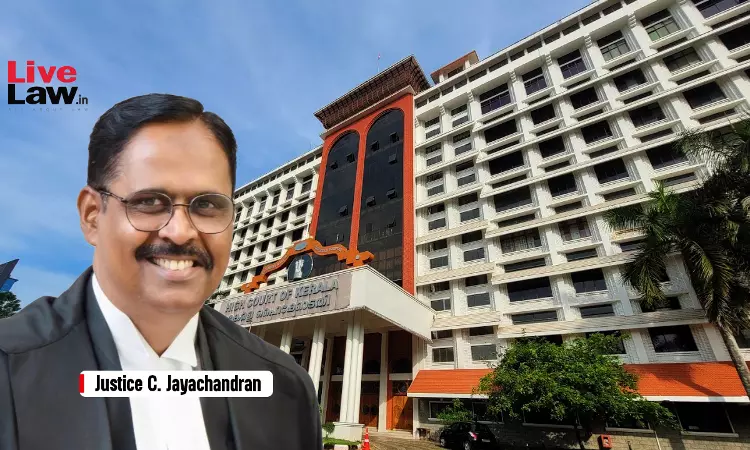- Home
- /
- High Courts
- /
- Kerala High Court
- /
- Pendency Of Suit Over Respondent's...
Pendency Of Suit Over Respondent's Right On Shared Household Not A Bar To Order His Removal Under Domestic Violence Act: Kerala High Court
Manju Elsa Isac
21 May 2025 7:40 PM IST
The Kerala High Court held that the pendency of a civil suit concerning the title on a property is not a bar on giving an order under Section 19(1)(b) of the Protection of Women from Domestic Violence Act, 2005 (DV Act) to direct the alleged aggressor to remove himself from the shared household. Justice C. Jayachandran ordered thus in a challenge against the Sessions Court order which refused...
The Kerala High Court held that the pendency of a civil suit concerning the title on a property is not a bar on giving an order under Section 19(1)(b) of the Protection of Women from Domestic Violence Act, 2005 (DV Act) to direct the alleged aggressor to remove himself from the shared household.
Justice C. Jayachandran ordered thus in a challenge against the Sessions Court order which refused to affirm the Magistrate's order granting relief under Section 19(1)(b) saying that it would render the pending civil suit infructuous.
The Court observed that the consideration for the civil suit and a suit under DV Act are both different and therefore relief cannot be refused on the ground that a civil suit was pending. The Court said that the purpose of a direction to remove the person from shared household is to ensure that the aggrieved person is not subjected to any further domestic violence. The Court held that if the court is satisfied that the victim is a woman who was subjected to domestic violence and there was a domestic relationship between the victim and aggressor, the relief under DV Act can be granted.
“.. the title or other legal interest of the respondent in the shared household is of little significance. Instead, what is significant is the right of residence of the aggrieved person in the shared household in terms of the D.V. Act and the protection of that right by shielding her from any act of domestic violence.”
Facts of the Case
The petitioner, an 84-year-old woman had filed a complaint under the DV Act against her son before the Magistrate Court. The Magistrate granted the reliefs claimed under Sections 18 and 19 including a direction to the son to vacate the shared household. However, in an appeal before the Sessions Court, it overturned the direction to the son to remove himself from the house. The Court held that the petitioner could not resort to DV Act to evict her son from the household when a civil petition seeking his eviction is pending before the civil court. The instant petition is filed challenging the order of the Sessions Court.
The petitioner's daughter is conducting a case before the civil court claiming her title to the shared household based on a settlement deed. The same settlement deed gives life interest in the property to the petitioner. The daughter is the power of attorney holder of the petitioner and evidence was adduced through her. The son contended that his mother was made a tool by her daughter for her personal motives.
Observations of the Court
The Court noted that as per Section 36 of the DV Act, the reliefs under the Act is in addition to those under any other law and therefore a civil suit does not bar a grant of relief under Section 19(1)(b).
However, the Court following the law laid down in Janki Vashdeo Bhojani and Others v Indusind Bank Ltd. and Others (2005) observed that the power of attorney holder cannot give evidence in matters in which she does not have direct or first-hand knowledge. In the complaint, the petitioner had raised 2 specific instances of harassment at the hands of her son about which occurred in the absence of the daughter. The Court further observed that permitting a power of attorney holder to depose about issues within the exclusive knowledge of the petitioner would take away the respondent's right to cross-examine the petitioner.
The Court however taking into account the FIR and final report filed against the respondent and considering the age of the petitioner observed that substantial justice should not be thwarted on technical grounds. On the other hand, the requirement to ensure that the whole proceedings were not initiated by the petitioner's daughter for her personal interest was also emphasized. Considering these aspects, the Court directed the Sessions Court to record the evidence of the mother within 3 months. The Court added that during the process, the son should be afforded an opportunity to cross-examine.
Counsel for the Petitioner: Advocates Manu Roy, A. K. Neslin, S. Sreekumar (Sr.)
Counsel for the Respondents: Advocates C. P. Udayabhanu, Navaneeth N. Nath, Rassal Janardhanan A., Abhishek M. Kunnathu, Boban Palat, P. R. Ajay, P. U. Pratheesh, K. U. Swapnil, M. Ramesh Chander
Case No: Crl.Rev.Pet. No. 1197 of 2023
Case Title: Omana Thomas v Ajith Prakash and Others
Citation: 2025 LiveLaw (Ker) 285
Click Here To Read/ Download Order

